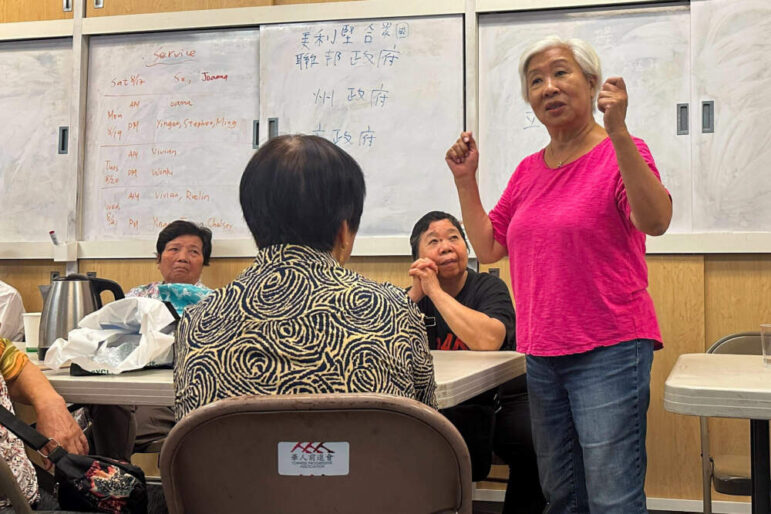In the kitchen of a Chinatown community organization, a group of seniors gathered for a voter education forum. On this day, Suzanne Lee, president emeritus of the Chinese Progressive Association, spoke about the role voters play in local politics.
Her aim was clear: to empower immigrant citizens with a deeper understanding of their voting rights.
One of the regular attendees, Li Laifang, is in her fifth year voting in the United States. She said the discussions help her know the candidates and their policy agendas before she marks her ballot.
But another thing she counts on: ballots in her primary language.
“I only speak Chinese, so I really need the ballots in Chinese translation,” Li said in Cantonese.
Of Massachusetts’ 351 municipalities, the secretary of state’s office said 19 offer multilingual ballots.
Under federal law, if a town or city has over 10,000 residents speaking a non-English language — or more than 5% of voters — election materials and ballots must be translated into that language.
But there are smaller groups that need language assistance, too.
In Massachusetts, nearly 10% of residents speak English with limited proficiency. In the state’s 2022 midterm election, federal data show, eligible voter turnout rates for Asian and Hispanic voters was about half that of white voters.
Advocates say the low turnout rate was partly due to language barriers.
While alternative accommodations like an interpreter joining a citizen in a ballot booth are possible, Lee said the best way to protect voting rights is to provide ballots in citizens’ first language.
“If we have bilingual ballots, then we wouldn’t need anybody to go into the booth to help them,” Lee said. And that reduces the chance of anyone trying to influence voters, she added.
Back in the 1980s, Lee said some elderly members of the community claimed poll workers were telling them how to vote.
“The interpreter pretended to help them and went into the voting booth with them, but voted for them,” Lee said. “[Voters] didn’t even actually ask for help.”
Lee said it took the group years to mobilize community members to testify about their experiences in front of government officials.
“That’s not an easy feat in the immigrant community because people normally don’t like to be involved with the court or the government,” Lee said. “So it took a lot of education, continuous meetings and talking to people to see what questions they have and answer those questions.”
The Chinese Progressive Association reported the allegations to Boston’s election department and Secretary of State William Galvin in 2003, saying election workers manipulated voters’ choices while showing them how to use the voting machines.
The community group helped some voters document their experiences for a U.S. Department of Justice investigation.
In 2005, the DOJ sued the city of Boston for violating the federal Voting Rights Act. The city settled, agreeing to provide bilingual ballots on a temporary basis for Chinese and Vietnamese communities.
Almost a decade later, former Gov. Deval Patrick signed a law that made Chinese and Vietnamese bilingual ballots available in Boston precincts where more than 5% of voters speak that language.
Today, in addition to Chinese and Vietnamese, Boston provides Spanish ballots. Fourteen other Massachusetts cities and towns also must provide ballots in Spanish. Lowell has ballots in Spanish and Khmer. Malden and Quincy offer Chinese ballots, and Randolph provides them in Vietnamese.
But for those who speak other languages, election officials still rely on poll workers to help them.
“One of the goals I’ve had as a city clerk is to make sure there is bilingual capabilities at the polls,” said Worcester city clerk Niko Vangjeli. “We try to assign poll workers from all over the city and areas that have large populations of multilingual [voters].”
Worcester provides English and Spanish ballots, but these accommodations are important for the city’s Vietnamese, Twi and Portuguese-speaking populations.
He said state law allows a poll worker to provide language assistance at the voting booth — so long as there’s a second official of a different political party with them. He added that bilingual poll workers will be placed in precincts with high concentrations of voters who speak other languages, as determined by census data.
“They don’t provide any information on the candidates, on the platforms or what they stand for,” Vangjeli said. “The only thing that we are allowed as election officials is just to read the ballot and instructions.”
In Worcester, each polling station for both early voting and Election Day is equipped with a city cell phone that has access to a language hotline providing ballot translations in 70 different languages. The city also relies on electronic ballot marking machines that have both English and Spanish options for those with disabilities to vote independently.
Boston offers voters similar kinds of help. The city provides ballot question explainers in 11 languages that voters can access online and at the polls in every precinct.
Across Massachusetts, the secretary of state’s office said it has distributed informational booklets translated into Spanish, Traditional Chinese, Vietnamese and Khmer. Ballot questions, registration details and voting procedures also are available in formats like American Sign Language.
Voter rights advocates say the best way to expand voting access for non-English speakers is to provide ballots in as many languages as possible.
In Massachusetts, voters can vote by mail, which allows them to get language help at home while filling out their ballot.
____
Learn more about how to register, request mail-in ballots and all the ways you can vote here.
This article was originally published on WBUR.org.

